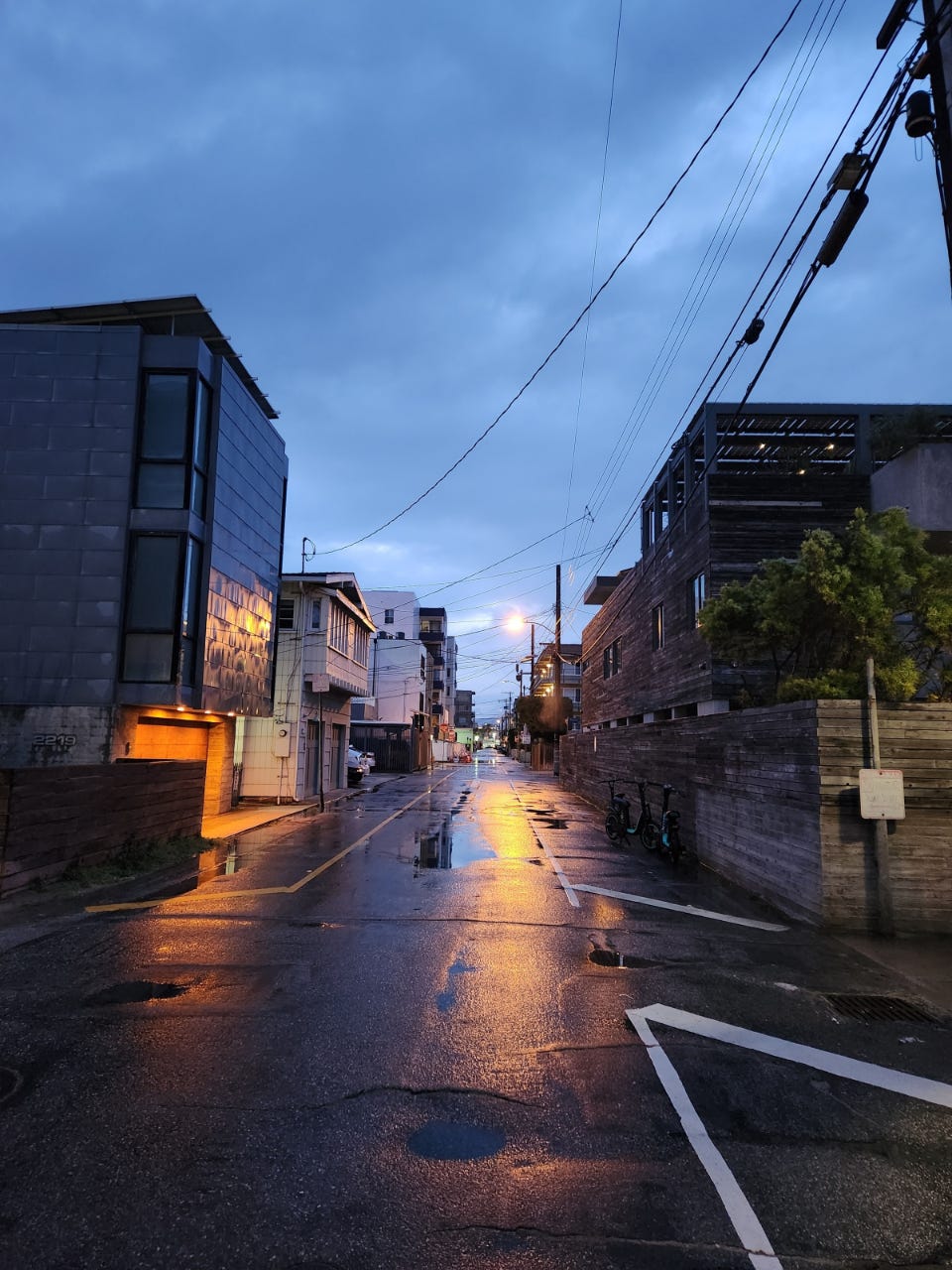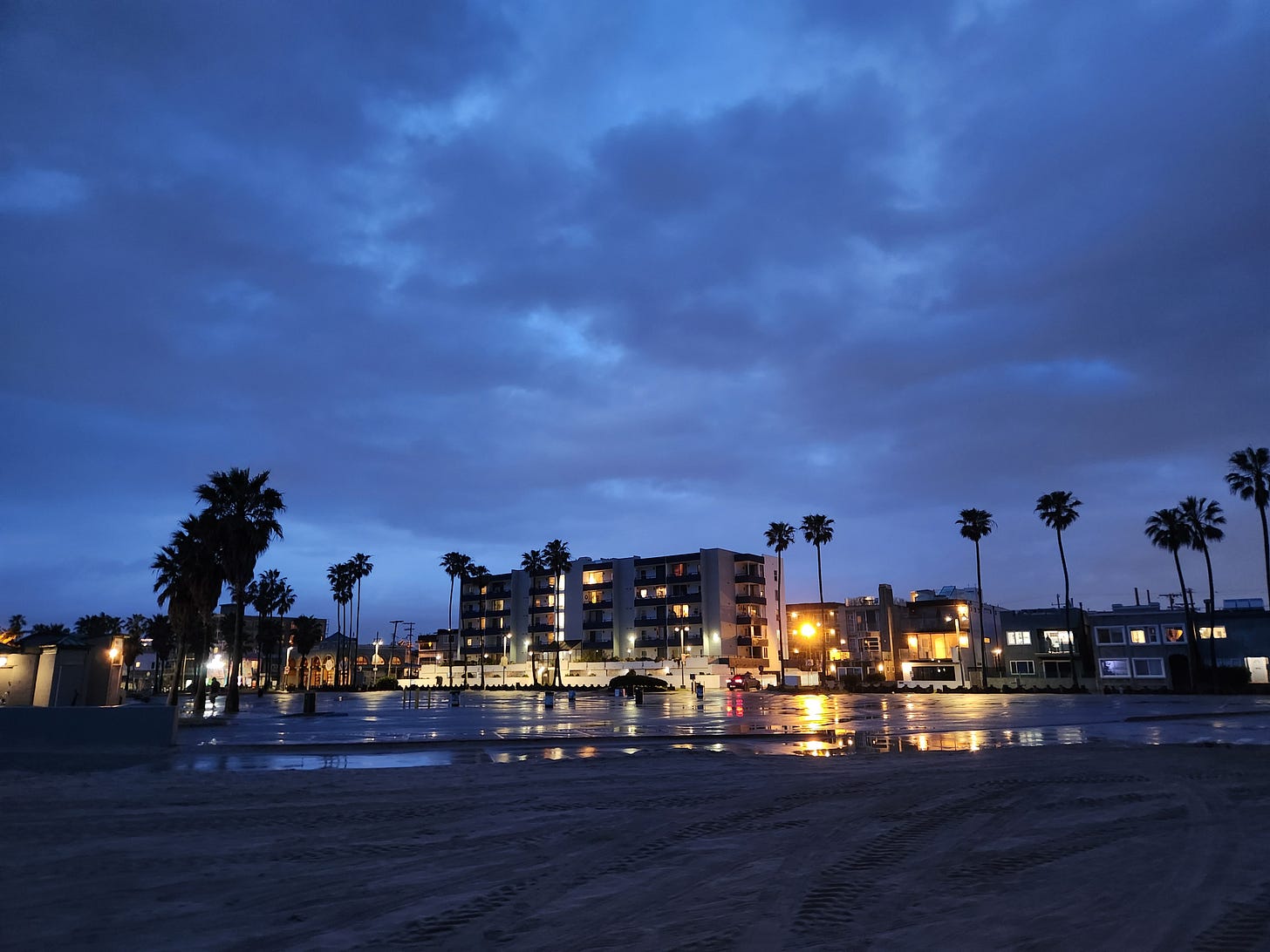California gurls, Joan Didion, Vibe writing...
languish, commitments to exploration
I see your hair is burnin’
Hills are filled with fire
If they say I never loved you
You know they are a liar
Drivin’ down your freeways
Midnight alleys roam
Cops in cars, the topless bars
Never saw a woman
So alone, so alone
-L.A. Woman, The Doors
“Understanding California” has been on my mind since I started spending time in Los Angeles a few years ago and certain peculiarities would come up every now and again.
I have written before how the movie Under the Silver Lake helped me understand what seems obscure behind the seeming transparency of L.A. I have now encountered Joan Didion, who is famous for explaining the nuances of the psycho-social-landscape of growing up and living in California.
I am awaiting the delivery of a collection of Didion’s most famous works from 60s and 70s era, including Slouching Towards Bethlehem and Play It As It Lays, on a friend’s recommendation.
I will write about what I learn, afterwards, but I wanted to make a record before I learned too much, what was ever confusing. What was confusing to me about California, before I get my questions answered?
I was very inspired to read Didion’s work after watching the Netflix documentary, Joan Didion: The Center Will Not Hold, as a recommendation from this same friend.
I was really taken in by this movie.
It moved me.
It stirred the heart chambers.
It brought me back to a place where I am thinking about my relationship with writing, again.
Hmmmm, how so?
I do not know! Leave me alone to languish! Achhh!!
I do not want to tell you my thoughts about this or about anything at all.
But I am demonstrably eating some parsley stems, making tea, melting an onion into my stew, healing some new fall sickness, and demonstrably not languishing.
This is new.
To my cold east coast soul, writing feels impractical. It is a guilty pleasure. There isn’t actually an amount of compliments that can fully cure this philosophically driven anguish. It does not matter if the writing helps anyone, practically, in the end, either. I am sinful for partaking in something so indulgent. I am cursed right at the start. I am cursed for wanting to write, for wanting to write, about anything at all. For wanting to express myself, for showing you how I see the world.
Look! I am eating my cut up parsley, in front of my potted planted parsley in the window. Is this sinful too? I can watch it looking at me. Like eating a chicken nugget in front of a chicken.
Guilt about writing is not particularly new, and neither is guilt about just about anything. A lot of religions take great effort into making something of guilt, making it make sense, giving it a framework, giving people ways to make parts of guilt feel pleasurable, or beautiful.
Didion talked about writing for her as “figuring out what she thinks,” which is certainly how writing has played a role in my life. She also talks about as writing as a way of remembering your own engagement with the world. You put it out there, and it comes back to you. You give your writing, and then years later, you read it again and it gives you back yourself.
Writing always felt very indulgent to me. Who cares what you think? And Joan has an answer to this: you do. On your deathbed, you will have yourself, and your opinion of yourself.
Not all writers grapple with this question of a writer’s authority, or a writer’s mandate to write in the same way. But very many do grapple with it. I like the way Didion grappled with it. The writing created reality, in a way.
I remember a friend, a few years ago, telling me that I should write more volume with lower standards. Get more out there! He told me when I asked him what authority I had, he said that the authority I have is in the process of bothering to write. In figuring out how to write something, I am thinking about it. In thinking about it, I am earning a right to share what I am thinking.
That felt very beautiful to hear, and did “unstuck” me in a big way, so much that I included it in a pamphlet on overcoming writer’s block.
Didion seemed like she was taking it one step further. She saw something beautiful in who you become, when you write. The writing transforms you. It clarifies you, it makes you look where you are scared to look.
Often I am scared to look where I care about. Often I am scared to write. But by looking there, I can at least know what I am scared of, and engage with it. And somehow through the writing and the sharing, I always end up learning that other people are scared, too.
I will be in California in November, having made a social commitment with a third party to write on this blog every day for a month!
This blog has been a lot of fun for me, but I still find myself circling, like a bird, towards what is “the point.” Every so often someone asks me what this blog is about, and I remember that I have not actually written the “canon” posts that really explain what it is I am trying to circle towards.
I hope to spend November writing some of those posts, and so I am trying “clear some cache” before then. It is October 1st, I have a month.
I will probably have to contend with the idea of “writing from the hip” — perhaps my version of what some people are calling “vibe writing.”
I am happy that AI is giving people who previously thought they did not have a creative output in verbal media, a way to write. But I am seeing that a lot of people who are into vibe writing are not very interested in writing; they are interested in diagrams. And this makes sense to me; a lot of the people using AI to make writing are more technical, mathy people. When I read their AI writing, I am seeing pointers. “Look here, look here.” They are drawing me a picture, showing me where to look. But this is different from writing.
I have found that when I read people’s AI work, I generally am not “reading.” I am “scanning,” which I also find to be different from skimming bad writing. I am “reading their writing” as if I am scanning a diagram.
I do not use AI in my writing on this blog. I do not use it for idea generation, I do not use it for editing, I do not use it for organization, I do not use it for copy editing. There have been times and places where I have used AI for different stages of the writing process, for certain kinds of writing. I know what it can do, and I’ve been impressed with it. But I do not use it here. I am not drawing diagrams. I am not showing you where to look next. Where to look next is the next sentence. This is reading. You can read if you are moved to read. Then there is a connection.
This post is something like an attempt at vibe writing. I am scared to write this post, I am scared to explore what it is about, but I want it to exist before the feeling goes away, before I forget what it ever felt like to want to write this post — which could be as early as next week! But instead of looking outward for help, to an AI assistant, I look outward to help in Joan Didion. And she would tell me to turn inward.
Which brings me back to the question of what I wanted to do with this post—what is so confusing to me about California? What makes me want to read Didion’s entire collection of work, to find out?
There is a lot of “void” in California. I believe that learning something about how people in a void “create themselves” or “create meaning in the void” can be helpful to people, myself included, who find themselves in a desert of some sort. Perhaps they were misplaced somehow, from their home. Perhaps they got cut off from their forests, or their rivers or oases. Perhaps “something changed” and people feel like a lot of things they once knew feel slightly off, and they are cut off from a source that fueled them.
Didion writes about some of these things, and I think in such situations it is good to think about what was fueling you, what was good about it, what was bad, how the resource you were using actually works. Often people find stability in things that are not actually as stable as they appear, and they have to find something else. Often the something else is also not stable.
California has a lot of natural resources. It also imports a lot. California is a desert and filled with wildfires, but is also where gold rushes and Hollywood happened. California is a place famous for crazy dreams actually coming true, and also it is famous for crazy suffering. (Didion writes about the Manson murders as the real end of the 60s.)
People from California, to me, sometimes seem like they are doing a different thing from people from the east coast. The relationship to identity seems different. Perhaps on the east coast, where so much depends on the weather that day or the season—what to wear, when to come home, if it’s safe to drive, which projects or repairs one does on their house—the dream of is some relaxation from all these external constraints on who you are and what you do to really get to be yourself. Summer and winter breaks at school were because the weather is so severe, it’s hard to think very much. Fall meanwhile is perfect for the start of something cerebral.
I have had dreams of California growing up, where I can relax, and just be. And so for me, once that state is actually attained, what comes next? When you have the peace of mind to be able to be who you want to be, how do you decide? And does it matter?
I see how Californian cycles of ennui can occur. BoJack Horseman clicked for me and for many people, and for a reason. It seems like there are success modes for building out your identity from scratch, with the frontier spirit, but also failure modes. I would say that I currently do not know much about the difference, or what people do to grapple between these two modes.
That is one of the main questions I hope to figure out.
I also consider California different in these purposes from areas with good weather further south, for example all of Latin America.
California compared with Miami and Latin America will be an area of future research.



